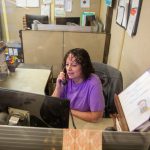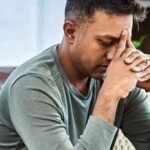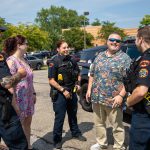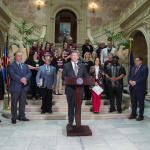The tragedies unfolding across the country are harsh reminders of the senseless shooting in Pittsburgh last year. Fear and anxiety are common reactions, and protecting children is a concern for all caregivers. We spoke with Dr. Jack Rozel of UPMC Western Psychiatric Hospital and resolve Crisis Services.
For those who are having anxiety due to mass shootings, people who find themselves afraid to go into public spaces, what advice would you give someone who feels that way?
A. After any widely reported disaster, many people will report increased anxiety. This could be feelings of worry, tearfulness, physical discomfort, intrusive thoughts, feeling like your heart is racing, poor appetite or sleep. Anxiety symptoms that are brief, tolerable, or which go away on their own over time are generally not concerning. Anxiety symptoms which get worse or start to interfere with major activities – like being afraid of going to public spaces – are usually worth having checked out by a doctor or mental health professional. If somebody is really feeling like they are having a hard time, it is perfectly reasonable to reach out for more support or help.
What can help people after an event like this?
A. Talking with supportive friends and family can be valuable. Online in a pinch, but face to face can be better. Making sure to engage in favored activities as well as basic day to day tasks like eating healthy and getting enough rest can be important. And turning off the news (after finishing this article) and social media for a little bit to take a break from the constant reminders and triggers can be invaluable.
There are lots of resources for people impacted by events like this including:
resolve Crisis Services, 888-796-8226, offers free confidential phone, mobile, walk in, and residential crisis support to the residents of Allegheny County and are available 24/7/365.
The National Suicide Helpline is available regardless of location and can be reached at 800-273-7255, online at https://suicidepreventionlifeline.org/chat/ or by texting “TALK” to 741741.
For people directly impacted by a disaster like this, there is a national Disaster Distress Helpline at 1-800-985-5990 or text TalkWithUs to 66746 to connect with a trained crisis counselor.
How should a parent or caregiver talk with kids about the way things have changed?
A. It can be a very difficult conversation sometimes, so first and foremost, parents and caregivers need to give themselves and their children permission to take time to process it. I usually suggest beginning with an open ended question, like “I was wondering what you have heard about that event, how are you doing with that?” They may have heard little or nothing and may not be concerned. Exploring questions like “how are you feeling about that?” can be helpful. Children may have questions and we should ask if they do. It is OK to answer with “we don’t know” but we should avoid any answers with graphic content. Most importantly, we can reassure them: sometimes bad things happen, but there are lots of people who work very hard to stop them from happening and to make sure that people are taken care of if they do happen.” Being compassionate, patient and supportive will be far more valuable than having the “right” answer in a conversation like this.
For more from Dr. Rozel on KDKA-TV, click here.









